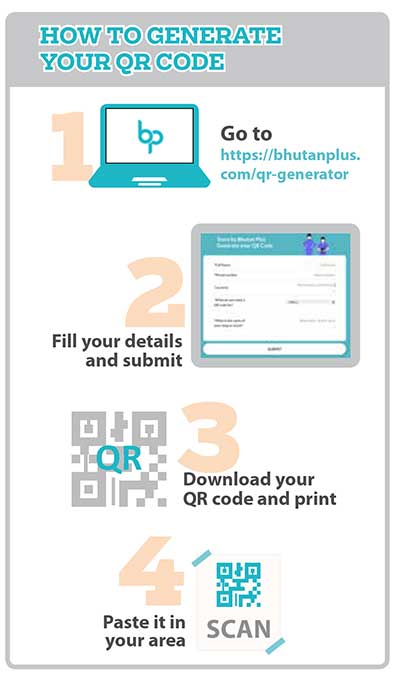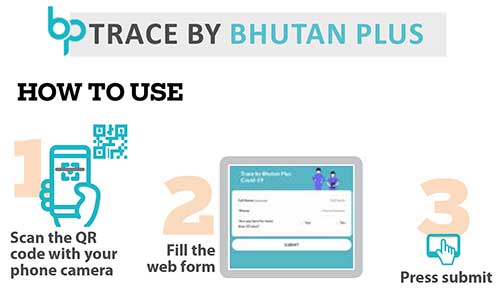A tech entrepreneur provides platform to trace people in the wake of Covid-19 pandemic
Younten Tshedup
The novel Coronavirus outbreak has given automated delivery a new sense of urgency.
From Israel to China to Singapore and South Korea, governments around the world are leveraging technology to track and contain the global pandemic.
Back home, even as government agencies and tech firms are actively engaged in developing technology-based software and apps, people at individual capacities are doing their part.
Sonam Pelden, a technology entrepreneur has come out with a simple mechanism to trace people in the event of community outbreak in the country.
Developed within just two days, the web-based application, Trace by Bhutan Plus, uses a QR code and stores data, namely, the location and time when it is used.
QR (quick response) code is a two-dimensional version of a barcode, which refers to the instant access to information hidden in the code.
How does it work?
Ideally designed for public spaces including shops and offices, a QR code has to be created for the space. After generating the code, it can be downloaded and placed in an area visible to everyone visiting the space.
People – clients, customers and anyone visiting the public space will then need to scan the code using either their phone camera or through the WeChat scanner.
A web-form will then open after each scan and prompt the user to enter the name (optional) and phone number (mandatory) before submitting.
Each scan contains information about the location, along with the date and time of scan including the user’s phone number, which would then be stored in a secured server for 21 days.
“We are working on an automated version of this, so users do not have to enter their phone number every time they scan. But we released the first version because I believe in the philosophy that, done is better than perfect,” said Sonam Pelden.
On the security aspect, she said the system would only store the phone number in a secure server, which would not be made public. She said that the data would only be generated for contact tracing if a person is suspected to possibly be exposed to Covid-19.
The only personal data collected is the phone number, so that authorities can contact the person more quickly if she or he had been in close proximity to a positive case or in a high-risk area.
“If we need your data for contact tracing, we will seek your consent before sharing with anyone. The information does not reveal your identity to anyone.”

Need of the hour
Sonam Pelden said that Trace by Bhutan Plus is not a mobile app, meaning one does not have to download or install any additional app on the phone.
“Building an app takes a longer time. I wanted something up and running quickly because, so long as it has the functionality, keeping it simple and making it available to public fast is important for now.”
However, the system is secure and accessible to all, she added.
The tech entrepreneur said, while more sophisticated and automated applications are probably being developed, Trace by Bhutan Plus is a filler to allow people to get an idea of using scanning and tracking their own locations. And it is also to raise awareness on the importance of contact tracing.
“This is by no means a perfect or complete product. We have come up with this based on the skills and resources we have at the moment.”
She said that seeing the entire country come together to help each other and work together during these last few weeks inspired her to develop the system. “Trace for Bhutan Plus is free for everyone to use and it is my way of contributing in assisting our leaders during these unconventional times.”
She added that there are human errors and it would require strong community coordination to make it effective.
While every possible measures to contain a community transmission has been put in place, the increasing number of people coming in from high-risk areas and with more than 200 people already discharged from the quarantine centers, there is always a small probability of having a local transmission within the country.
In such cases, Sonam Pelden said that the system would help trace not only where the positive person went in the 21 days, but also trace others who have visited those places at the same time.
The QR code also comes as an alternative to the ongoing log-keeping practised manually by cabbies in most of the dzongkhags.
Trace by Bhutan Plus is more suitable in an urban environment. “I think for public transport like a taxi, this would be an efficient way to keep track of the passengers,” she said. “On top of keeping their manual log, our system will not only help keep a record of their passengers but also show them the data of where these individuals have been before and after taking the taxi.”
This, according to her is like big data coming to life where people are keeping track of everything that they are doing.
In just one hour after releasing Trace for Bhutan Plus on Tuesday morning, more than 100 unique QR codes were generated by shops and offices including a few Lhakhangs and Goenpas around the country.


